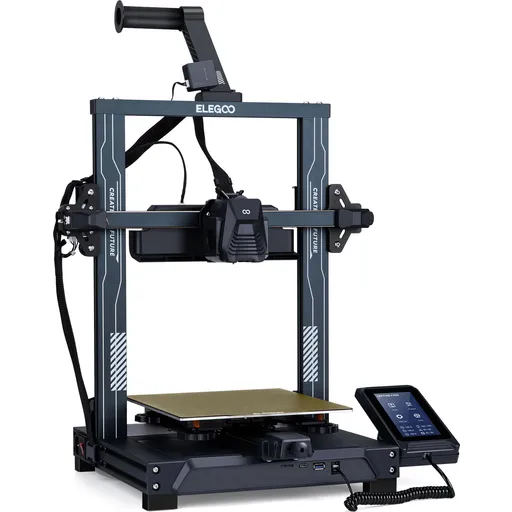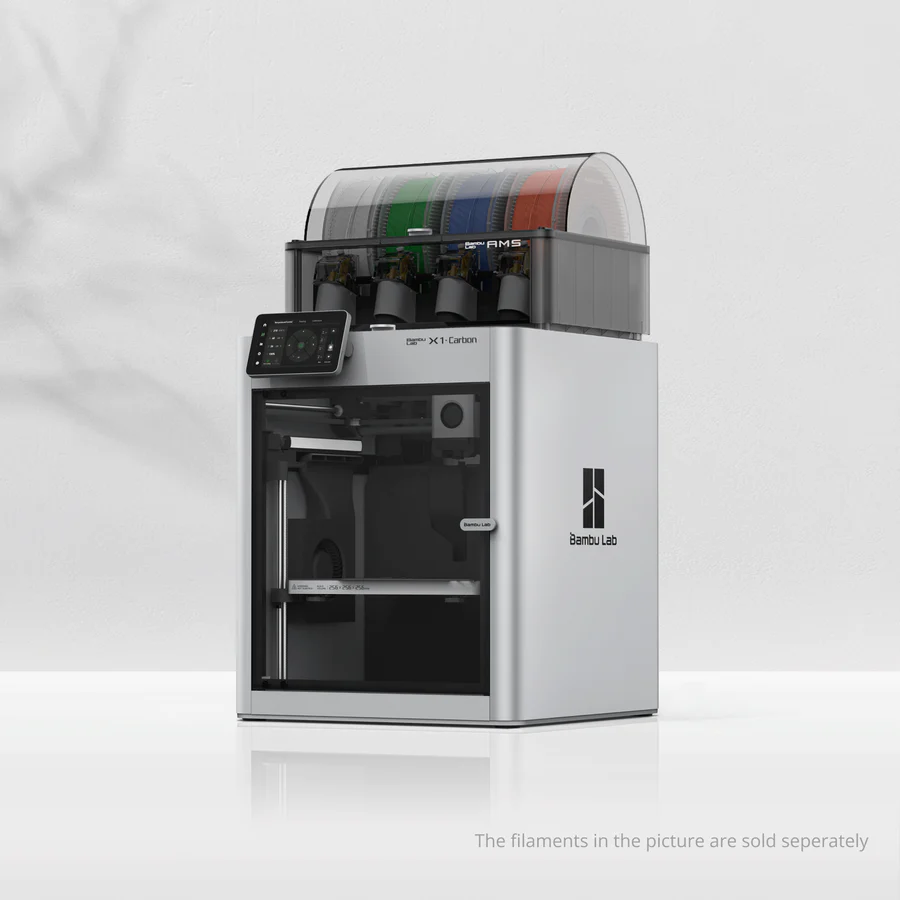Compare Neptune 4 PRO vs X1 carbon
Comparison between the best 3D printers
Choose the best 3D printer at the best price. The cheapest 3D printers are here.
Buy a 3D printer here with 3D Fila.
 |
 |
|
| Model | Neptune 4 PRO |
X1 carbon |
| Printing Material | Filament | Filament |
| Buy Filament for Elegoo Neptune 4 PRO | Buy Filament forBambu Lab X1 carbon | |
| Estimated price | $359,00 | $1449,00 |
| Manufacturer | Elegoo | Bambu Lab |
| Release Year | 2023 | 2023 |
| Print Volume [mm] | 225x225x265 | 256x256x256 |
| Printer Size [mm] | 475x445x515 | 389x389x457 |
| Weight [kg] | 8,9 | 14,13 |
| Power Loss Recovery | YES | YES |
| Enclosed printer | NO | YES |
| Bed Leveling | Automatic | Automatic |
| Filament End Sensor | YES | YES |
| Bed type | Heated | Heated |
| Power supply system | Direct Drive | Direct Drive |
| Standard nozzle | 0,4 | 0,4 |
| Maximum Nozzle Temperature [°C] | 300 | 300 |
| Maximum Bed Temperature [°C] | 110 | 120 |
| Maximum printing speed [mm/s] | 500 | 500 |
| Filament holder | YES | YES |
| Camera for supervision | NO | NO |
| Recommended filaments | PLA, PLA+, TPU, PETG, Nylon, ABS | PLA, PETG, TPU, PVA, PA, PA-CF, Nylon, PC |
| Recommended slicers | Bambu Studio, Super Slicer, Cura, Prusa Slicer, Orca | Bambu Studio, Super Slicer, Cura, Prusa Slicer, Orca |
| Maximum Resolution [mm] | 0,1 | 0,1 |
| Processor | ARM 64 bit | Quad ARM A7 1.2 GHz |
| Display | Touchscreen 4,3'' | Touchscreen 5'' |
| Power Supply | 310 W | 350 W |
| Connectivity | USB, microSD | Wifi, Bambu bus, Cartão SD |
| Operating systems | Windows, Linux, Macbook | Windows, Linux, Macbook |
| Date of registration in the system | 2024-07-02 | 2024-04-10 |
| Release date | 2023 | 2023 |
| Extra features | The Elegoo Neptune 4 Pro stands out for its advanced features, including pre-installed Klipper firmware, a dual-gear direct extruder with a 5.2:1 ratio, a high-temperature nozzle (up to 300°C), a flexible magnetic PEI platform, efficient cooling fans, and a 121-point auto-leveling system. The printer also features a 4.3-inch touchscreen interface, dual linear bars on the X and Y axes, and a segmented heated bed for energy savings. | The Bambu Lab X1 Carbon revolutionizes 3D printing with stunning design, high print speeds, and a streamlined user experience. It stands out with its CoreXY system, a hotend capable of reaching 300°C, allowing for a wide range of filaments. Its LiDAR-assisted bed leveling system, vibration compensation, and AMS multicolor printing capability raise the industry standard. Print quality is impressive, with the ability to fine-tune for perfection. The X1 Carbon, with its closed build volume, not only promises but also delivers one of the most advanced 3D printing experiences available to consumers. |
| Support for multiple colors and materials (AMS and CFS) | NO | YES |
Notes * |
||
| Cost-benefit | 7 / 10 | 7 / 10 |
| Hardware | 2.8 / 10 | 5.6 / 10 |
| Tela | . | . |
| Print volume | 3 / 10 | 4 / 10 |
| Performance | 4 / 10 | 4 / 10 |
Conclusion |
| In comparing the Elegoo Neptune 4 PRO and the Bambu Lab X1 Carbon, several key distinctions emerge that cater to different user needs and budgets. The Elegoo Neptune 4 PRO presents a much more budget-friendly option, offering an impressive set of features for its price point, including a high-temperature nozzle, advanced auto-leveling system, and decent print volume. It's particularly appealing to hobbyists and those just starting in the 3D printing realm, as it provides excellent value for the money while still delivering quality prints. On the other hand, the Bambu Lab X1 Carbon is positioned as a premium choice, incorporating advanced technologies such as the CoreXY system, LiDAR-assisted bed leveling, and support for multiple filament types with its AMS feature. It targets more experienced users or professionals seeking high performance, versatility, and the ability to produce complex prints with impeccable quality. The closed design also ensures better thermal stability, which can lead to superior print results. Ultimately, the choice between these two printers hinges on budget constraints and specific printing needs. The Neptune 4 PRO shines in cost-effectiveness and usability for beginners, while the Bambu Lab X1 Carbon excels in innovation and advanced features for dedicated professionals. This decision reflects a balance between immediate affordability and long-term investment in quality and capability. |

